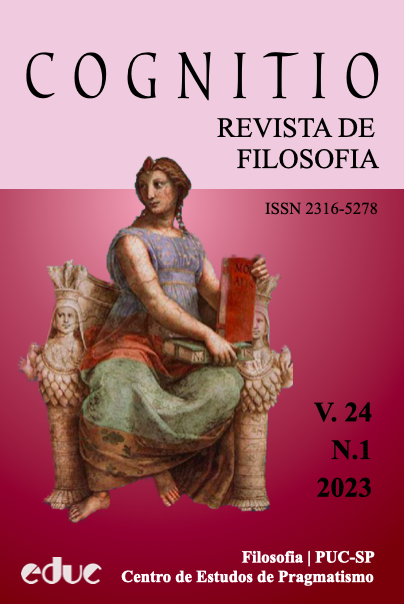A falsa trivialidade da verdade
como a semântica Frege-Tarskiana descaracteriza o desafio de determinar a posição estratégica apropriada para asserções
DOI:
https://doi.org/10.23925/2316-5278.2023v24i1:e60571Resumo
A teoria semântica de Frege, do modo como está formulada, não fornece chaves semânticas suficientemente universais para interpretar sentenças asseríveis em diferentes níveis de complexidade, como (a) sentenças contrafactuais-modais-intensionais e (b) sentenças extensionais. É possível dar universalidade a uma chave que sirva para os dois casos adicionando parâmetros não clássicos, como mundos possíveis, que permitem que sentenças com alto grau de complexidade não extensional ocupem um lugar trivial na hierarquia de Tarski como substitutos elegíveis para o esquema T. O artigo argumenta que não é trivial encontrar essas condições não falsas (se verdadeiras) sob as quais sentenças complexas podem ser tratadas como substitutos elegíveis do esquema T. É um desafio que requer vários ajustes de consistência para lidar com várias extensões concorrentes do predicado “verdadeiro”. Concluiremos que a concepção semântica de Frege-Tarski (enriquecida por pressupostos não clássicos), distorce esse desafio. Ele distorce o problema que enfrentamos na prática diária para fortalecer nossos sistemas de asserção, planejar estratégias de asserção bem-sucedidas e proteger nossas asserções de reversões de valor semântico. O desafio para nós é pragmático e não pode confundir (1) complicadas condições científicas e empíricas de assertividade com (2) as condições recompensáveis de pontuação que estabelecem os parâmetros segundo os quais alguém aprende a usar sentenças em sua língua nativa.
Referências
CARET, C. R. & HJORTLAND, O. T. Logical Consequence: Its nature, structure, and application. In: CAR- ET, Colin R.; HJORTLAND, Ole T. (eds.). Foundations of Logical Consequence. Reino Unido: Oxford Uni- versity Press, 2015.
CARNAP, R. Introduction to semantics. Cambridge, MA: Harvard University Press, 1948.
CARNAP, R. Truth and confirmation. In: FIEGL, H.; SELLARS, W. (Eds.). Readings in philosophical anal-
ysis. New York: Appleton-Century-Crofts, 1949. p. 119-127.
DAVIDSON, D. Inquiries into Truth and Interpretation. Oxford: Clarendon Press, 2001.
DAVIDSON, D. Truth, Language and History. Oxford: Clarendon Press; New York: Oxford University Press, 2005.
DUMMETT, M. The Logical Basis of Metaphysics. Cambridge, MA: Harvard University Press, 1991. ETCHEMENDY, J. The Concept of Logical Consequence. Stanford, CA: Center for the Study of Language
and Inf. 1999.
FREGE, G. Sense and Reference. The Philosophical Review, v. 57, n. 3, p. 209–230, 1948. [https://doi. org/10.2307/2181485].
HEMPEL, C. G. Studies in the Logic of Confirmation I. Mind, 54(13), p. 1-26, 1945. [https://doi.org/10.1093/ mind/LIV.213.1].
HORSTEN, L. The Tarskian Turn: Deflationism and Axiomatic Truth. Cambridge, MA: MIT Press, 2011.
KRIPKE, S. Outline of a Theory of Truth. The Journal of Philosophy. Seventy-Second Annual Meet- ing American Philosophical Association, EasternDivision, v. 72, n. 19, p. 690-716, 1975. [https://doi. org/10.2307/2024634].
TARSKI, A. Truth and proof. Scientific American, 220(6), p. 63-77, 1969. [https://doi.org/10.1038/scientifi- camerican0669-63].
Downloads
Publicado
Como Citar
Edição
Seção
Licença
Copyright (c) 2023 http://creativecommons.org/licenses/by/4.0/

Este trabalho está licenciado sob uma licença Creative Commons Attribution 4.0 International License.









